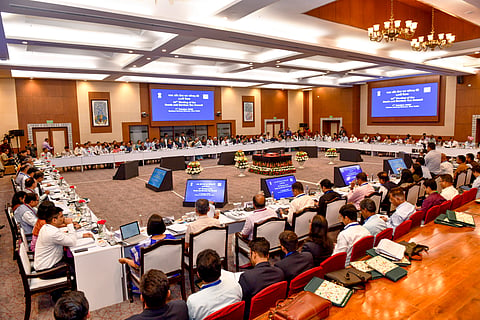

MUMBAI: The GST Council will be meeting later on Monday to discuss an array of important issues, including the much-discussed GST rate on life and health insurance policies. The meeting may also discuss rationalisation of rate structure under the GST.
TNIE has earlier reported that the meeting will focus on proposals aimed at rationalising the current GST structure, which currently imposes an 18% tax on mediclaim premiums, a rate that many stakeholders argue is unsustainable for consumers and insurers alike.
According to sources, among the proposals under consideration are options to allow mediclaim companies to charge a reduced GST rate of 5% without the benefit of input tax credit (ITC) or to implement a uniform 5% GST rate specifically for business-to-consumer (B2C) supplies.
As per sources, the Council may also announce extending the GST amnesty scheme for another year—FY21. However, all the States need to be in consensus on providing amnesty scheme for another year, say sources.
TNIE in August had reported that the Ministry of Finance will also issue a circular regarding the Amnesty Scheme, recently proposed in the Budget 2024. The scheme aims to provide relief to taxpayers by waiving interest and penalties under certain conditions for tax matters arising between July 1, 2017, and March 31, 2020.
In addition to these topics, the agenda may also include a discussion on the refund of excess payments made by the Centre to states during the GST compensation period. The issue of compensation has become increasingly pertinent as states continue to raise concerns about financial challenges.
Another important item on the agenda will be the clarification regarding the valuation of payments for services received from related parties, particularly in light of recent cases involving Infosys. This clarification is expected to provide much-needed guidance to businesses that engage in inter-company transactions under the GST framework.
Also, in the list of discussion during the meeting is issue of threshold limit for imposition of GST on maintenance charges levied by Resident Welfare Associations (RWAs).
According to sources, the threshold limit may be increased to Rs 9000–10,000 per month. Currently, maintenance charges paid by residents to RWAs are exempt from GST up to Rs. 7,500 per month per member. However, should the monthly charge exceed this limit, GST is levied on the entire amount, provided the aggregate turnover of the RWA reaches Rs. 20 lakh or more.
Also, the GST applicability on the transfer of development rights within the joint development agreements (JDAs) in the real estate will likely be discussed. A JDA is a legal contract that facilitates collaboration between landowners and developers to undertake construction projects on the landowner's property. In India, JDAs have become a prevalent method for real estate development across various sectors.
In addition, the Council may deliberate on under-construction properties as well. The panel on real estate is reportedly in favour of reducing GST rates on under-construction properties to enhance housing affordability.